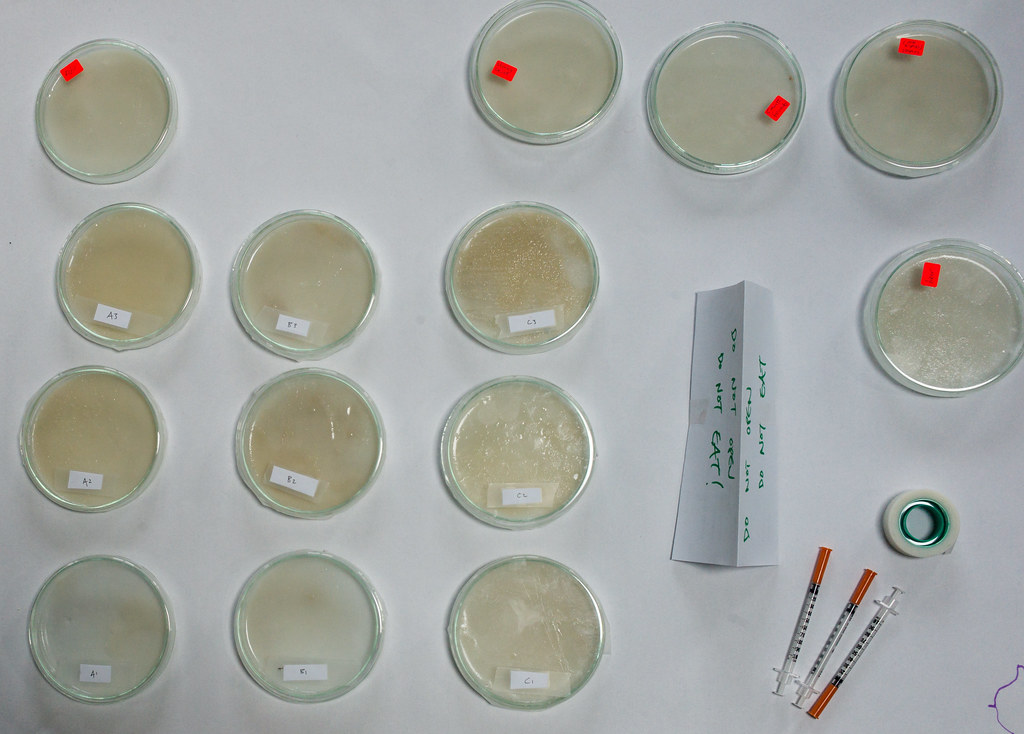Table of Contents
Biochymickal Arts 2013
FoAM's Splinterfields workshops explore emerging technological arts through the lens of preindustrial crafts and contemporary sciences. In Biochymickal Arts we get our hands dirty with bio-hacking as we learn the fundamentals of biochemistry and the craft of fermentation.
During the workshop we entangle theoretical discussions about biochemical concepts with hands-on experiments in a wet lab and kitchen. The workshop is designed as a master class, bringing together practitioners and enthusiasts in the art, science and technology of biochemistry and fermentation to learn from one another and find connections between their respective fields of interest.
(Participants: nik gaffney, Maja Kuzmanovic, Rasa Alksnyte, Cocky Eek, Brian Degger, Pieter de Wel, Michka Melo, Meredith Patterson, Maria Tarantino, Natalia Borissova, Eva Bakkesle, Hugo Herter, Martynas Savickis, Pascal Baes, Riita Oittinen, Ariana Jordao, Guillian Graves, Philippe Chatelain)
- notes from each day of the workshop
- tracking the progress of the sample cultures » culture_tracking_201309
- the Finnish love affair with rye bread http://kasviksenabelgiassa.wordpress.com/2013/09/30/the-finnish-love-affair-with-ruisleipa-sourdough-rye-bread/
fermentation
- Maria's blog post about Biochymickal Arts: http://tarantinofoodvice.wordpress.com/2013/09/15/biochymickal-arts-workshop-at-foam-brussels-fermented-vegetables/
- Plants used in the first dinner: http://tarantinofoodvice.wordpress.com/2013/09/15/picking-fields-at-the-estuary-of-the-river-somme/
- more info on funazushi (scroll down to posts on “funazushi” and “tench”) http://tarantinofoodvice.wordpress.com/category/japan/
- more info on kishk. http://tarantinofoodvice.wordpress.com/category/fermentation/
- La Paillasse: Paris Open Biotech Lab wiki with protocols http://www.lapaillasse.org/wiki/index.php?title=Accueil
- Fermentation as an anaerobic(without oxygen) process pathways http://upload.wikimedia.org/wikipedia/commons/e/e6/Cellular_respiration.gif

biochemistry / biology / bacteriology
- identification of bacterial cultures
- general principles » http://www.jlindquist.net/generalmicro/102bactid.html
- “Identifying Unknown Bacteria Using Biochemical and Molecular Methods” » http://www.nslc.wustl.edu/elgin/genomics/Bio3055/IdUnknBacteria06.pdf
- staining samples
- growth medium

biohacking
- “WE HAVE ALWAYS BEEN BIOHACKERS”
- foodhacking » download the PDF of FoodPhreaking #0 here » http://www.foodphreaking.com/issue0pdf/Food_Phreaking.pdf (~15 mb)
- E. chromi - Living Colour from Bacteria » http://www.daisyginsberg.com/projects/echromi.html
- The Synthetic Kingdom » http://www.daisyginsberg.com/projects/synthetickingdom.html
links and references
- Books available in the FoAM Library » https://www.zotero.org/groups/splinterfields/items/collectionKey/TPHI6AM7
- “Setting Up a Microbiology Lab” http://www.indiebiotech.com/?page_id=53
- “Chymists and Chymistry. Studies in the History of Alchemy and Early Modern Chemistry” » http://www.shpusa.com/shp_books/chymists-and-chymistry/
Food
ongoing questions & open loops
- Q: how effective is a microwave for sterilisation? pressure cooker as autoclave? A: Microwave, prob not, pressure cooker as autoclave, they are different, operate at different pressures. (see discussion(http://www.mdtattoos.com/facemaster.cfm?task=message_list&thread_index=106017))
- Q: good recipes for stains? A: Betadine was good, just the slicing let us down.
- Q: GFP and/or Luciferase?
- Q: can we determine vitamin content of fermentations? A: Not easily, need further research
- Q: cheap vitamin C determination?
- Q: what increases/inhibits vitamins?
- Q: which Lactobacillus are able to produce vitamin C (see: L-ascorbate biosynthesis I, L-ascorbate biosynthesis II)?
- Q: which microorganisms can be chosen to increase vitamin production or production of specific amino acids
- Q: what sort of things can be done in a 'kitchen lab' and what needs more specialised analytic equipment?
- A: a decent microscope.
- Q: is there a good reference for korean techniques?
- Q: “How can we reboot the ascorbate synthesis pathway in humans?”
- Q: Can we use fermentation/remediation to decrease nitrate pollution of vegetables? [Natalia Borissova paraphrased by Brian]

